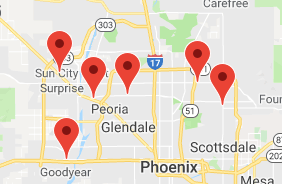According to the center for hearing and communication, approximately 12% of the population in the United States suffers from significant hearing loss. For most people, however, the quest to find the right hearing aid can seem overwhelming. Here is some easy-to-understand information about the many different hearing aid styles available.
Behind-the-Ear
A BTE, or behind-the-ear hearing aid, is the most noticeable of all hearing aid types. Most of the parts of this type of device are contained in a small curved plastic case that rests behind the ear. A clear tube is connected to this case and runs to an ear mold or earpiece that fits securely inside of the ear. This is generally the type that is recommended for children. The fitted earpiece can be replaced with a larger one as the child grows.
On-the-Ear
On-the-ear hearing aids are actually a mini version of the larger BTE type. Instead of a noticeable plastic case, new technology has made parts and batteries small enough to be contained in a much smaller and less noticeable container. The tube that runs from the case to the ear canal is almost invisible to most people. This type generally has a small ear bud type of connector instead of the full ear mold.
In-the-Ear
An ITE, or in-the-ear aid, is one that is worn completely inside of the ear. Its parts are contained in a shell that fits inside of the outer part of the ear. It is much less noticeable than an over-the-ear type of device, but can still be seen by those who know what to look for.
Completely-in-the-Canal
This type of hearing aid can be broken down into two sub categories. Both are very small devices that fit into the ear canal. An ITC or in-the-canal unit fits into a tiny case in the ear canal. A CIC or completely-in-canal unit is the smallest type of hearing aid available and offers the best hearing advantages for many people. Their small size means they often go completely undetected by others.
With all of the information available about different hearing aid types, there is no need to be overwhelmed. A qualified audiologist will be able to help you with any questions you may have and put your mind at ease. Call (602) 639-4064 today to schedule an appointment with an audiologist at Metro Hearing.

